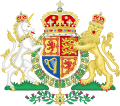| Lord High Treasurer of the United Kingdom | |
|---|---|
Charles Talbot, 1st Duke of Shrewsbury, last holder of the office as Lord High Treasurer of Great Britain in 1714 | |
| His Majesty's Treasury | |
| Type | Great Officer of State |
| Appointer | The Monarch |
| Term length | At His Majesty's Pleasure |
| Precursor |
|
| Formation |
|
| First holder | Nigel of Ely as Lord High Treasurer of England |
| Final holder | Charles Talbot, 1st Duke of Shrewsbury as Lord High Treasurer of Great Britain |
| Superseded by | |
The Lord High Treasurer was an English government position and subsequently a British government position since the Acts of Union of 1707. A holder of the post would have been the third-highest-ranked Great Officer of State in England, below the Lord High Steward and the Lord High Chancellor of Great Britain.
Contents
The Lord High Treasurer functioned as the head of His Majesty's Treasury. The office has, since the resignation of Charles Talbot, 1st Duke of Shrewsbury in 1714, been vacant.
Although the United Kingdom of Great Britain and Ireland was created in 1801, it was not until the Consolidated Fund Act 1816 that the separate offices of Lord High Treasurer of Great Britain and Lord High Treasurer of Ireland were united into one office as the "Lord High Treasurer of the United Kingdom of Great Britain and Ireland" on 5 January 1817. [1]
Section 2 of the Consolidated Fund Act 1816 also provides that "whenever there shall not be [a Lord High Treasurer of the United Kingdom of Great Britain and Ireland], it shall ... be lawful for His Majesty, by letters patent under the Great Seal of Great Britain, to appoint Commissioners for executing the Offices of Treasurer of the Exchequer of Great Britain and Lord High Treasurer of Ireland". [1] These are the Lords Commissioners of the Treasury. In modern times, appointments of the Lords Commissioners of the Treasury were, by convention, given as sinecure positions to the prime minister of the United Kingdom, usually serving as the First Lord of the Treasury, and the chancellor of the exchequer, serving as the Second Lord of the Treasury. Other members of the government, usually whips in the House of Commons, are similarly appointed to serve as the Junior Lords Commissioners of the Treasury. [2]








